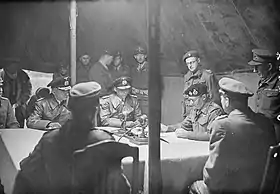Convention de Lunebourg
La convention de Lunebourg est le nom couramment donné en français à la capitulation sans conditions des troupes allemandes du Nord-Ouest de l'Allemagne, des Pays-Bas et du Danemark. Elle fut signée[1] le sous une tente de l'état-major du maréchal britannique Bernard Montgomery dans la lande de Lunebourg dans le Nord-Ouest de l'Allemagne, à quelques dizaines de kilomètres au sud de Hambourg.


Acte de capitulation
L'acte de capitulation était rédigé en anglais et en allemand, la version anglaise faisant foi.
1. The German Command agrees to the surrender of all German armed forces in HOLLAND, in northwest GERMANY including the FRISIAN ISLANDS and HELIGOLAND and all other islands. In SCHLESWIG-HOLSTEIN and in DENMARK, to the C-in-C. 21st Army Group. This is to include all naval ships in the areas. These forces to lay down their arms and to surrender unconditionally.
2. All hostilities on land, on sea, or in the air by German forces in the above areas to cease at 0800hrs. British Double Summer Time on Saturday 5 May 1945.
3. The German command to carry out at once, and without argument or comment, all further orders that will be issued by the Allied Powers on any subject.
4. Disobedience of orders, or failure to comply with them, will be regarded as a breach of these surrender terms and will be dealt with by the Allied Powers in accordance with the accepted laws and usages of war.
5. This instrument of surrender is independent of, without prejudice to, and will be superseded by any general instrument of surrender imposed by or on behalf of the Allied Powers and applicable to Germany and the German armed forces as a whole.
6. This instrument of surrender is written in English and in German. English version is the authentic text.
7. The decision of the Allied Powers will be the final if any doubt or dispute arises as to the meaning or interpretation of the surrender terms.
Signataires
- Royaume-Uni: Field Marshal Bernard Montgomery - comme commandant du 21e groupe d'armées britannique.
- Allemagne :
- Amiral Hans-Georg von Friedeburg - comme commandant en chef de la Kriegsmarine.
- Général Eberhard Kinzel - comme chef d'état-major de l'armée allemande du nord-ouest (Heer).
- Contre-amiral Gerhard Wagner - comme chef du département opérationnel de l'état-major de la Kriegsmarine.
- Colonel Fritz Poleck - représentant de l'Oberkommando der Wehrmacht (Heer).
- Major Hans Jochen Friedel - officier d'état-major du Général Kinzel (Heer).
Notes et références
- « Dictionnaire Larousse », sur Larousse.fr (consulté le )
- (en) Cet article est partiellement ou en totalité issu de l’article de Wikipédia en anglais intitulé « German surrender at Lüneburg Heath » (voir la liste des auteurs).